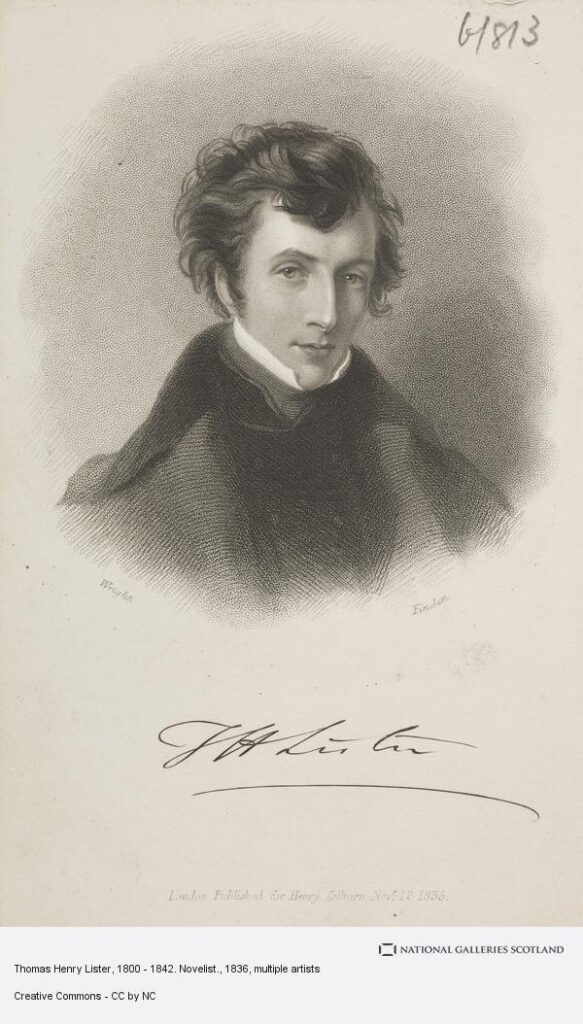
There is certainly an argument to say that Thomas Henry Lister was writing science fiction, or even what might be called steampunk, in 1829 when Jules Verne, credited by many with being the founder of science fiction, was only one year old. And ‘Voyage To The Centre Of The Earth’ was not even published until 1870, over forty years later. Never mind H.G.Wells whose novel ‘The Time Machine’ didn’t appear until 1895.
Thomas was born in Armitage in 1800 at Armitage Park, (later called Spode House and then Hawkesyard), and was a refined, accomplished man. He wrote various society novels e.g. Granby, as well historical plays (‘Epicharia’) and biographies (‘The Life and Administration of Edward, first Earl of Clarendon).
He also wrote a play called ‘A dialogue for the year 2130’ which appeared in The Keepsake, a literary annual, published in 1830. The play was sandwiched between a poem by Lord Morpeth and one by Coleridge. Other writers include Walter Scott, Wordsworth and Shelley so he was in distinguished company. At that time the internal combustion engine had not been invented and George Stephenson was still building the Rocket – Lister came up with a play which heavily featured steam-powered machines and other visionary ideas.
One of the ideas was the automaton note writer which suffered from an early form of predictive text error: ‘The fact is, that my automaton note-writer does make such dreadful mistakes that I must really have him taken to pieces. Do you know what he did the other day. He sent a note of condolence instead of congratulation! and it was on the event of old Lord Battersea’s marriage with that little flirt Miss Pipkinson. Nothing could have been more unfortunate. I dare say I am suspected of having done it on purpose.’
The idea of having up to date news was also present although he didn’t seem to think too much of reporters:
‘Mr. C. But where did you see the President’s speech?
Lord A. In a six-hourly paper that was published about two hours ago.
Mr. C. Ah! you have the advantage. My paper is a half-daily one. I believe I must leave it off. One never knows any news till it is old.
Lord A. Very true; a half-daily paper leaves one several hours in arrear. But after all, nothing that appears in print can deserve the name of news.’
Jules Verne wrote ‘Around the world in 80 days’ in 1872 and Lister’s characters blithely spoke of circumnavigating the world many times – they referenced a Circumnavigation Club – as well as visiting the North Pole (by using a concentrated essence of caloric to cut a track through the ice) and freely using the North West Passage around the top of America. One character had recently been fishing in a lake which may have been an idea for fish farming : ‘..the turbot would not run, and the mullet would not rise, and I caught only a few whiting and soles. We found a curious fish, now almost extinct, one of the old fresh water fish: they called it a carp. It really was not bad. I believe there was a time when the fish we now have in our lakes and rivers were thought to be capable of living only in the sea.’
His use of automation included a steam-powered porter who answered doors, steam-propelled horses, self-acting door knockers, announcement tubes and a stair-lift (it was called an Introduction Chair and took you to the upper floors).
At the beginning of the play Lister introduces the idea of guns shooting at 27 times per minute at a time when they were still pretty much using muzzle-loading muskets capable of 3 or 4 shots per minute. It was part of a discussion about grouse shooting and leads you to a society purportedly 300 years in the future but still very much class based. There were still beggars and road sweepers but they were now scientifically educated and dropped French and Latin into their conversation – the idea of educating the masses was clearly in Lister’s mind but he hadn’t expected that it would change society. His world view shows through when he talks about the King of Canada, King of Carolina and Jonathan III of Washington and having friends in Moscow. One of society’s big talking points at the time was tariffs on imported food and this comes out when talking about a poor harvest in Tartary (roughly Central Asia) causing price spikes. By 2130 most of the world was of course speaking English and we no longer had colonies.
Have a look at A dialogue for the year 2130. Should Lister be recognised more for the birth of science fiction? Probably not, but if he had gone on to write books on the same theme instead of back to society novels with Arlington then who knows?

I think you are confusing fantasy with Science Fiction. Phantasy can be traced much further back to probably to Greece, Egypt, and China. Even as a child I could phantasy about going to the moon. But true Science Fiction surely involves contact and outworld experiences. Thus, journey to the centre of the Earth is a fantasy novel. The War Of The Worlds is truly Science Fiction
Many thanks for taking the time to comment. You are right of course but the general public recognise the term science fiction more than they do fantasy and the author Thomas Lister deserves more recognition. His Silver Fork Society novels show his knowledge of the High Society he belonged to and the ‘science fiction’ short story shows that a member of that class could not conceive of an ending to the rigid class structure. By the time he had written it, he was moving on to political matters but unfortunately died at an early age – who knows what he could have become?